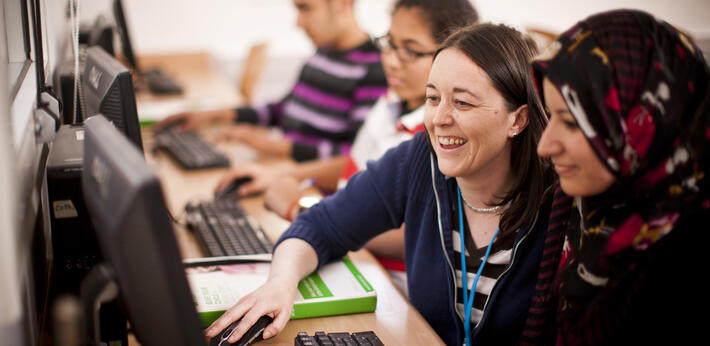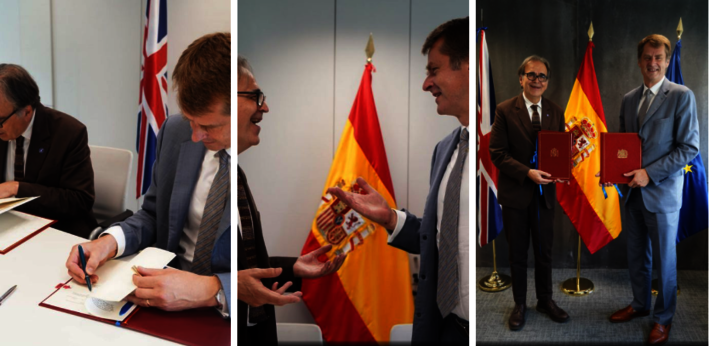You are here
Home ›08/07/2020
Europe - Covid-19 update - 8 July 2020
This post is to keep UK institutions updated on disruptions across the EU Europe region caused by the Covid-19 pandemic. For more information, updates, webinars and other engagement opportunities, please see ‘Europe and education: Stay connected during Covid-19’.
Please note that we will be publishing this Covid-19 Europe update on a less regular basis over the summer. Please continue to check for individual country updates - and we hope you have a great summer!
These posts focus on ten priority countries: Bulgaria, Cyprus, France, Germany, Greece, Italy, Ireland, Poland, Romania and Spain. This week: France, Germany, Italy and Romania.
- France: Baccalauréat results announced with 91 per cent success rate, causing some concern among universities around place availability
- Germany: Funding opportunity for German-British/Irish collaborations for projects on digital learning and international teaching
- Italy: Minstry of Education pushing for fullest face-to-face return to education possible in September
- Romania: Low Bac success rate, explained by high number of students resitting tests.
If a country you’re interested in doesn’t appear here, or if you would like more details, please check the previous weeks’ updates or contact the country representative.
- 1 July: Germany, Greece, Ireland, Romania
- 24 June: Bulgaria, Cyprus, Germany, France, Romania, Spain
- 10 June: France, Germany, Ireland, Romania, Spain
- 3 June: France, Germany, Greece, Ireland, Italy, Romania
- 27 May: France, Germany, Ireland, Italy, Romania, Spain
- 20 May: Bulgaria, Cyprus, Germany, Greece, Ireland, Poland, Romania, Spain
- 13 May: Cyprus, France, Germany, Italy, Ireland, Romania, Spain
- 6 May: Bulgaria, Cyprus, France, Germany, Greece, Romania
- 29 April: Cyprus, France, Germany, Greece, Italy, Poland, Romania
- 22 April: Germany, Greece, Spain
- 16 April: Bulgaria, Cyprus, France, Romania
- 8 April: Bulgaria, Cyprus, France, Greece, Italy, Poland, Romania, Spain
IELTS tests have been affected in all countries in Europe as a result of Covid-19 precautions. For the latest update by country, please check: https://www.ielts.org/news/2020/changes-to-ielts-test-arrangements-in-some-locations-due-to-novel-coronavirus. We are monitoring the situation very closely and will continue to provide updates as the situation develops.
For more Europe updates, webinars, market insights and other services in international higher education, please go to your alerts settings and select updates by region from Europe.
If you have any feedback, please contact me or any of the country staff listed below.
Thank you - and stay safe.
Almut Caspary – Higher Education and Research Lead, EU Europe (Almut.Caspary@britishcouncil.org).
Updated 7 July
France is still in an état d’urgence sanitaire (state of health emergency) and will probably remain so until at least 12 July, if not longer. There have been 128 cluster outbreaks and new cases rose by 528 yesterday. There has been a reshuffle in France's government, and Jean Castex has been named new Prime Minister with Jean-Michel Blanquer remaining as Minister for Education and Frédérique Vidal responsible for higher education, research and innovation.
School and university closures
French nurseries and primary schools were fully open for two weeks and have now closed for the summer. In most cases, it has been reported, students and teachers have been pleased to get back to see each other in person.
Examinations
The results of the baccalauréat were published yesterday (7 July). The success rate was 91 per cent - far, far higher than previous years, for example last year when the success rate was 77 per cent before resits. This is due to the unprecedented way the bac was awarded this year through a mix of continuous assessment and 'harmonisation' jury. Some higher education institutions are now concerned that they will now not have enough places for the coming academic year. Some are preparing catch-up courses for less successful students.
British Council activity in country
We are now increasing the number of students able to take our examinations to up to 100 students at a time in some cases. Delivery has now expanded to many locations throughout France including Paris, IDF, Marseille, Nice, Toulouse, Strasbourg and Bordeaux. The team is delivering Cambridge exams as well as IELTS. More than 70 teachers have been successfully teaching online during confinement and we are planning to launch MyClass both face to face and online for adults from September.
On the higher education side, our focus is on actively promoting UK studies following the government announcement about ending home fee status and the likelihood that fewer EU students will come to the UK from 2021 onwards. A series of British Council conferences will be held in the autumn, including a webinar for the ELSA Network on the impact of Brexit and Covid-19 and challenges facing the UK HE sector.
Contact
For more information about France, please contact Catherine Saracco (Catherine.Saracco@britishcouncil.fr).
Updated 6 July
Important note: Education in Germany is largely devolved to the 16 federal states. This means that although there are agreed Germany-wide principles, there are differences in dates of exams, holidays and regulations for schools and higher education institutions. Public health measures are also in the hands of state governments and local authorities, creating an increasingly mixed picture across the country as lockdown restrictions are eased at different paces depending on local case numbers and the severity of infections.
With the exception of a few local outbreaks, numbers of new Covid-19 infections appear to be on a downward curve. The German government is now in summer recess, Gradual relaxation of Covid contingency measures is noticeable across the country. A number of major investments were agreed at the eleventh hour to support and stimulate economic recovery, including a one-off €300 child bonus, temporary reduction of VAT until end of 2020, tax reductions for companies and an increase in tax exemptions for single parents. Chancellor Angela Merkel announced a further €383 million to fight to end Covid-19, the funds will go towards the development of vaccines, tests and medicines and the accessibility of these worldwide.
Germany has launched its contact-tracing 'Corona-Warn-App"'. As of 6 July it had been downloaded 15 million times. Despite a few teething issues, the Robert Koch Institute, Germany’s public health body, is encouraged by engagement with the tool, which needs participation from at least 15 per cent of the population (12.48 million) for its detection sytstem and interruption of infection chains to work. The state of Bavaria has announced free Covid-19 tests for all; however, the Federal Minister for Heath has declared that he favours targeted tests over mass testing, warning of the danger of a false sense of security that can come with negative test results.
On 1 July, Germany took over the EU Council presidency for six months with the motto, 'Emerging stronger from the crisis together – For a competitive, innovative and resilient European economy'. The presidency programme sets out ambitious objectives with a focus on competitiveness, cohesion, trade, digitisation and energy.
School and university closures
Primary and secondary schools and universities have partially reopened with reduced class sizes and distancing regulations. In all states, kindergartens have reopened.
Summer holidays have now started for seven federal states including Berlin and Nordrhein-Westfalen. All federal states have agreed that school pupils should return to school after the summer break as long as the number of infections is low and with some measures in place to keep new infections to a minimum.
Many states are planning voluntary face-to-face summer school programmes to support school students from lower socio-economic backgrounds to catch up on content they might have missed. These initiatives have had considerable interest, with 11,500 registrations alone in the state of Berlin.
The assumption is that blended learning will continue for at least part of next academic year. Federal states have agreed on an emergency programme for schools ('Sofortprogramm') worth approximately €550 million which will provide schools with digital devices that they can loan to pupils and equipment to create professional online teaching services in schools.
University applications and admissions processes for the 2020-21 intake have started.
The majority of universities are expecting to teach mostly online until the end of the year. Some are planning to allow students to return to campus in the autumn.
One of the less populous states has even asked its six public universities to return some of the agreed increase in their budgets for the years 2022-24 to the state government in order to offset the Covid-19-related budget deficit.
Examinations
Abitur (A-level equivalent) grades have been issued in some states. Others will issue results later in July.
Despite Covid-19, average Abitur results (including in Berlin) are slightly higher this year or have remained similar. The media has praised students for their resolve and resilience in dealing with the uncertainty around their exams.
As students can decide if they want to take their university exams or not, universities have to offer them either in person or online. One small state, Hessen, has temporarily changed its state higher education laws to ensure students, researchers and universities are not disadvantaged by the pandemic, with measures including extending time and contracts for researchers.
Financial and academic support
Germany is offering funding for German universities and their British/Irish partners within the International Virtual Academic Collaboration (IVAC) programme. The programme promotes the integration of digital learning and international teaching collaboration. The deadline for applications is 16 July. The call for applications is here: https://www.daad.org.uk/en/2020/06/24/international-virtual-academic-collaboration-ivac-programme/
As of 25 June, 58,000 applications have been received for the €500 per month grants for June, July and August provided by the Federal Ministry of Education for students who are struggling financially as a result of the pandemic.
One smaller state has extended the official 'standard period of study' by one semester, meaning affected students will be eligible for financial support for an extra semester.
One year interest-free student loans, conceived as another mitigation measure for students in financial need, have so far proved unpopular, although this is perhaps unsurprising given that take-up of student loans in Germany has been low for years.
The federal government has also set up a scheme to support SMEs that provide vocational training or apprenticeships and are considerably affected by the crisis. The core offer of the package would be a bonus for enterprises of €2,000-3,000 per trainee, coming to a total of €500 million.
Other insights: UK in the media
There continues to be regular coverage of both Covid-19 in the UK and the stalling Brexit negotiations between the UK and the EU.
In the education media there is also regular speculation about the severe financial effect that both Brexit and Covid-19 may have on UK HE.
Contact
For more information about Germany, please contact Ailsa Kienberger (ailsa.kienberger@britishcouncil.de).
Schools and universities
The Minister of Education is working on a new decree covering schools and announced that the new school year will begin on 14 September with the right security measures in place. Students will attend lessons in person and not remotely. Those who need to attend catch-up courses will return to school on 1 September.
The Ministry of Education has issued general guidelines to universities on how to reorganise themselves in the wake of the emergency. According to their different structures, some universities will have exams and degree sessions in person while others will continue their activities online. The Minister of University and Research has recognised how universities reacted quickly quickly and successfully during the emergency to address any possible delays to digitalising their curriculum. Efforts will continue to strengthen online resources and tools. However, the minister is convinced that traditional teaching activities have great value and will need to be reinstated everywhere as soon as possible. From September, wherever possible, universities will resume in-person teaching together with some online activities. These are particularly for international students.
The Ministry is also in conversation with the European Commission regarding the reorganisation of the Erasmus+ programme. The aim is to ensure that students continue to have the chance to live in a foreign country for at least some time - an enriching experience that has been shown to make students on both sides feel better integrated in the European community and be more tolerant.
Examinations
The Italian equivalent of A-levels, Esame di Maturitá, are still in progress. Results are expected to be published in the next few weeks - results are not published on the same date at all institutions.
Contact
For more information about Italy, please contact Filomena Casamassa (Filomena.Casamassa@BritishCouncil.it).
Updated 7 July
School and university closures
Romania has seen a spike in new Covid-19 cases and deaths across the country. In this context, Health Minister Tataru said in a press conference following a cabinet meeting on 7 July that he could not give a definitive plan for the reopening of schools in September. He said that at the end of August, the government would be in a position to start talking about precise start dates.
Examinations
Final 'Bac' results (bacalaureat - Romania's A-level equivalent) were released on Monday 5 July. The pass rate after appeals is 64.5 per cent country wide. This rate is the lowest recorded in the last six years, partly because many of this year's results were retakes. The pass rate among first-time takers was 71.4 per cent, compared with a 25 per cent pass rate among retakers, according to the education site edupedu.ro (article in Romanian).
According to Romanian Ministry of Education statistics, the pass rates for previous years were:
- 2019: 67.2%
- 2018: 67.7% (before appeals)
- 2017: 72.9%
- 2016: 68.1%
- 2015: 66.41%
- 2014: 60.65%.
This year the number of students getting an average of ten (the highest possible mark) increased from 232 to 307 after appeals, the highest number recorded in the last 16 years (article in Romanian).
According to the Ministry of Education, of the 155,639 registered candidates, 147,794 candidates attended the examination, of which 120,627 candidates were from this year's intake and 27,167 were resitting.
Contact
For more information about Romania, please contact Gabriel Ivan (gabriel.ivan@britishcouncil.ro).
- Bulgaria: Ivaylo.Slavov@britishcouncil.bg
- Cyprus: pantelitsa.michael@cy.britishcouncil.org
- France: Catherine.Saracco@britishcouncil.fr
- Germany: ailsa.kienberger@britishcouncil.de
- Greece: Maria.Tsakali@britishcouncil.gr
- Italy: Filomena.Casamassa@BritishCouncil.it
- Ireland: Mags.Walsh@ie.britishcouncil.org
- Poland: Julia.Plachecka@britishcouncil.pl
- Romania: gabriel.ivan@britishcouncil.ro
- Spain: Carolina.Jimenez@britishcouncil.es






